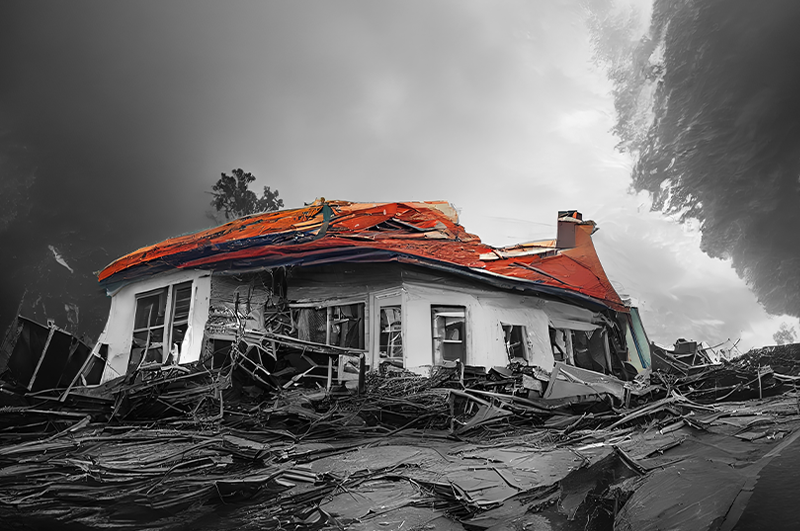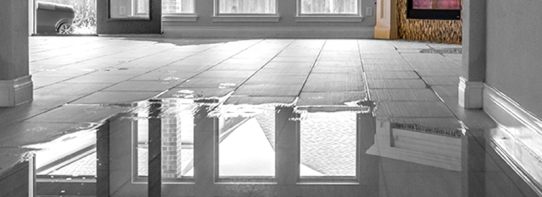Does Homeowner’s Insurance Cover Hurricane Damage?

Hurricanes are some of the deadliest, and most expensive natural weather disasters, with some causing well over $30 billion in damage from one storm system. According to the National Oceanic and Atmospheric Administration (NOAA), tropical hurricanes caused the most damage among all weather disasters between 1980 and 2021. During this time, hurricanes caused more than $1.1 trillion in total damage and had an average cost of $20.5 billion per storm.
Hurricane season typically spans from June 1 to November 30, with the peak of the season usually occurring in the early fall. NOAA’s Climate Prediction Center is predicting the 2022 hurricane season to be particularly problematic, with the administration forecasting a 65% chance of an above-normal season, including
- 14 to 21 named storms with winds of 39 mph or higher;
- six to ten of which may become hurricanes with winds of 74 mph or higher; and
- three to six of which may be considered major hurricanes in category 3, 4, or 5 with winds of 111 mph or higher.
This would mark the seventh consecutive above-average hurricane season. (1)
With the severity and devastation that often comes with hurricanes, it is especially important to make sure you, your loved ones, and your home and belongings are protected. Around this time of year, we often get many questions related to hurricane insurance like, what happens if your home is destroyed by a hurricane? Are hurricanes usually part of homeowner’s insurance? Does homeowner’s insurance cover roof damage from a hurricane? What is covered under hurricane insurance? Does hurricane insurance cover flooding?
We’re here to clear up any confusion you might have over insurance for hurricanes.
Just as hurricanes are complex storm systems, they are also complicated exposures that affect a myriad of aspects of a commercial or personal property and their hurricane insurance policies. Property damage and loss can stem from wind damage and water damage from rain and storm surges, as well as business disruptions if your company is impacted.
Property owners may assume hurricane damage and storm insurance claims are covered in their existing policies, but that may not be true.
For example, a typical homeowner’s insurance policy covers things like fire or smoke, explosions, lightning, and hail and windstorms, some of which may be involved in a hurricane. But they don’t all cover every natural disaster and losses incurred during them. For homes and businesses in coastal regions, some private insurers may not provide any hurricane insurance coverage to properties located in areas at a high risk for hurricanes.
What Does Hurricane Insurance Cover?
Hurricane insurance is a bit of a misnomer because hurricanes aren’t generally a named peril in standard property insurance policies. One way insurance companies usually handle hurricane insurance coverage is through special “named storm deductibles” in the event of a loss.
Named storm deductibles are triggered by a tropical depression, tropical storm, or hurricane that is severe enough to be named by the National Weather Service (NWS). The NWS began naming storms to make it easier for the public to track and follow them. As large hurricanes and tropical storms began to cause large amounts of damage, insurance providers started looking for ways to mitigate their losses from hurricane damage insurance claims. They did so by correlating their hurricane insurance and storm damage insurance coverage to storms the NWS names. Named storm deductibles ensure that insurance providers are responsible for a smaller portion of any loss caused by a named storm. It is important to note that some media organizations have started naming some storms to help their viewers understand what they are discussing, but these coverages extend only to those storms named by the NWS.
Depending on their individual risk, property owners will typically need to purchase supplemental insurance policies to have comprehensive insurance for hurricanes, including:
- Flood insurance to cover hurricanes for losses directly caused by flooding including building and contents coverage
- Windstorm insurance to protect policyholders from property damage caused by gales, winds, and hail
- Sewer backup insurance to guard against losses caused by a discharge of water or waterborne material from a sewer, drain, or sump, which can happen during or after a hurricane
How Much Does Hurricane Insurance Cost?
Your hurricane insurance cost will depend on what coverages your hurricane insurance includes. Every additional coverage you add, like windstorm, sewer backup, and hurricane flood insurance, will add to your overall cost. If your homeowner’s insurance covers hurricanes through named storm deductibles, they are generally higher than regular deductibles because they are based on a percentage rather than on a fixed dollar amount. They also can vary based on location. Most named storm deductibles are between 1 and 5 percent of your total insured amount, but in high-risk areas, deductibles can reach as high as 10 percent.
Deductibles for damage caused by named storms are higher to mitigate the financial risk to insurance companies providing storm damage and insurance claims while still offering premiums that are relatively low. Additionally, many hurricane insurance providers believe that the high deductibles will encourage property owners to take proactive steps to protect themselves from severe storms. Some of these steps include:
Before the Hurricane
- Store valuable papers and items in waterproof bags.
- Cover windows and secure any outdoor items.
- If you are told to evacuate, do so immediately.
During the Hurricane
- Tune into a battery-operated radio or TV and follow instructions.
- Seek shelter in an interior room away from windows, such as a closet.
After the Hurricane
- Stay inside until an “all-clear” is issued. If you were evacuated, don’t return until the area is safe.
- When inspecting your home, wear sturdy shoes and clothing for protection.
- Allow only those trained to turn off damaged utilities and appliances.
- Use only bottled water until tap water is determined safe.
- Contact your insurance agent promptly to report damages and file hurricane insurance
How Does Homeowner’s Insurance Work After a Hurricane?
The triggers for your hurricane homeowner’s insurance and added coverages will depend on the policy. Named storm deductibles can vary based on the insurance provider and location, although almost all triggers generally include a timing window, such as 24 hours before a storm is named by the NWS to 48 hours after it is downgraded to a tropical storm. During this window, your named storm deductible will apply to any damage instead of a normal wind and hail deductible. Other triggers can include when a hurricane makes landfall or when a hurricane watch is declared.
Because of the potential for devastation from these storms, it is imperative to protect your home and businesses from them with insurance for hurricanes. Do not assume your policy includes hurricane insurance. It is critical to work with an experienced insurance agent to make sure you are as protected as you can be. If we can help you navigate the intricacies of hurricane insurance, please contact us today.
- https://www.noaa.gov/news-release/noaa-predicts-above-normal-2022-atlantic-hurricane-season



